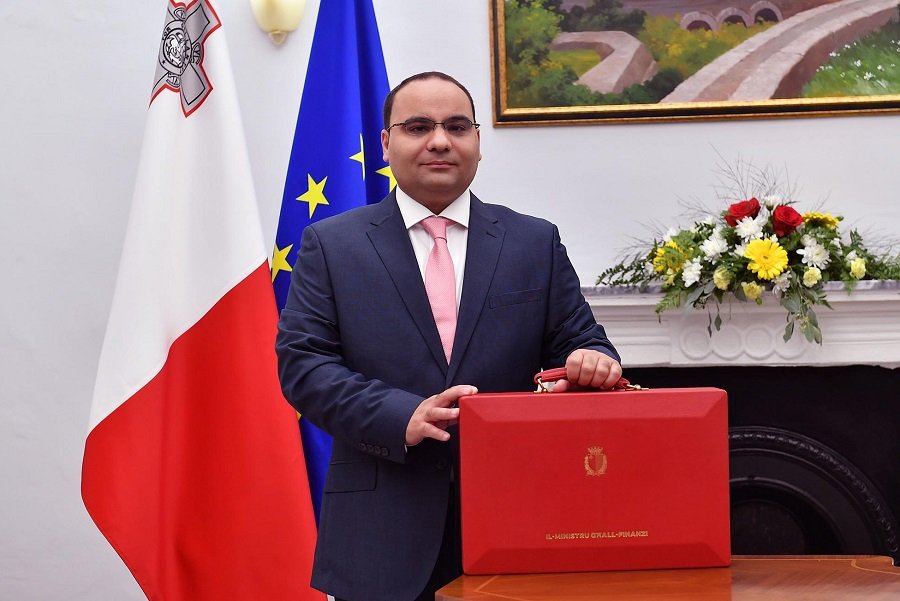“L-Aqwa Budget.” Is it?
The 2025 Budget landed with Malta’s usual mix of fanfare, and let’s not forget the hype about "L-aqwa Budget.” (the best Budget). It’s as if the members of our Cabinet have a cassette tape fitted in their vocal cords a week before the budget; every year, us citizens hear the same words.
But beyond the razzle-dazzle, let's critically analyse these new measures and see if they’re the real deal, or whether it’s another display of short-term fixes.
Finance Minister Clyde Caruana. Photo: TVM
Key Measures – The Highlights and the Hype
Finance Minister Clyde Caruana’s speech started with a quite unusual way due to the activists of Moviment Graffitti who disrupted Parliament with banners in hand, protesting Malta’s “developers’ playground.”
It was a jarring start, with shouts from the activists over construction development echoing through the Parliamentary chamber before security ushered them out.
Once the order was restored around 10 minutes later, Caruana went on to announce tax reliefs, increased allowances, and green incentives, all under the promise of “sustainable growth.” Here’s the gist:
Budget at a Glance:
● Income Tax Cuts: Broader tax brackets to deliver a yearly €475 boost per worker.
● COLA: A €5.24 weekly increase, though for many, it won’t bridge the gap between wages and rising costs.
● Free Gym Memberships: Six-month memberships for youths born between 2005 and 2007, to kick-start a healthier Malta.
● No VAT on Sanitary Products: A practical win for women’s health rights.
● Reduced Tax on Local Beers and Wines: A small toast to local producers and social cheer.
While this sounds promising on the surface, a closer look reveals more nuanced challenges.
Poverty and Inequality – Just Short of Meaningful Help?
The budget’s narrative of an “economy felt by the people” doesn’t resonate with households struggling to make ends meet. Soup kitchens in Valletta are serving more than 27,000 meals, and it’s clear to everyone that a €5 weekly COLA increase won’t be felt by these people.
The Malta Chamber of Commerce said that the Government had presented a timid budget to avoid upsetting anyone while providing meagre protection against the rising income inequalities.
Easing Daily Pressures – Incentives with Mixed Impact
Additional measures aim to relieve financial burdens, although their actual impact is up for debate:
● Children’s Allowance: A €250 increase per child, with more for third children.
● Pension Increase: Pensioners gain an extra €8 weekly, but rising inflation threatens to neutralize this gain.
● Wedding Grant: Couples to receive a €1,000 boost, which could inject some life into the local wedding industry.
More importantly, these measures may not go far in helping families ease the increasing cost of living in Malta, since here the beneficiaries are pockets of the general population.
Health and Well-being – Small Steps on Big Issues
Some healthcare sectors were given a €14 million fund to cut down waiting lists by subcontracting surgeries to private healthcare, with another €4.5 million dedicated to mental health. The removal of Value Added Tax on sanitary products is a direct benefit to thousands of women.
Still, Malta’s healthcare system remains plagued by staff deficit and structural issues which cannot be overcome by throwing the extra million or two.
Education and Skills – Building Future Skills or More of the Same?
Previous budgets have fallen short of dedicating more money for digital and technological innovation. Yet, Malta’s workforce will require more than funding; the use of public money will be key.
Reactions from Public Figures – Of Hits and Misses
KNŻ (National Youth Council):
The Kunsill Nazzjonali Żgħażagħ endorsed the reductionist budget focusing on economic stability and competitive growth, with a contained debt-to-GDP ratio of 49.5%. However, they pointed out missed opportunities, calling out the government to tackle core issues affecting youth: affordable housing, quality and affordable healthcare services, and effective transport infrastructure, highlighting how these are essential for the well-being of Malta’s young people.
Arnold Cassola:
Cassola gave a mixed reaction. He approved of the rise in allowances, especially the disability benefits with the rehabilitation assistance. Still, he has some fears, about quality of life issues, for example, whether the increase in pensions will be enough to counter the rise in inflation.
Opposition Leader Bernard Grech:
Grech took a much harsher stance, claiming the budget “sidesteps the basics,” failing to resolve key issues in healthcare, infrastructure, and living costs. To him, these measures were more about optics than real improvements to daily life.
Wayne Flask, Secretary of Il-Kollettiv:
Flask dismissed the budget as another example of “throwing money at structural problems.” While tax cuts were welcome, he warned they were superficial, and likely unsustainable. He criticised the government’s continued reliance on construction, with its limited economic return, as a sign of its unwillingness to shift toward a genuinely sustainable economy. Calling out the lack of a migration policy and serious investment in green initiatives, Flask argued the budget prioritised short-term gain over long-term stability and prosperity.
The Times, 4th November 2024
Final Thoughts
With critics calling this budget “timid” and “superficial,” and even youth groups pointing out missed opportunities in housing and healthcare, the question remains: has the budget delivered real change or just a fresh coat of paint?
The answer, as always, will depend on what happens once the headlines fade, and the numbers hit home. Only time will tell if this “L-aqwa Budget” lives up to the hype or ends up being another recycled promise.

